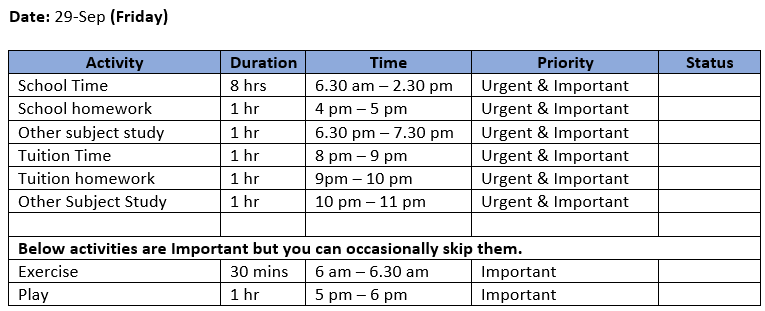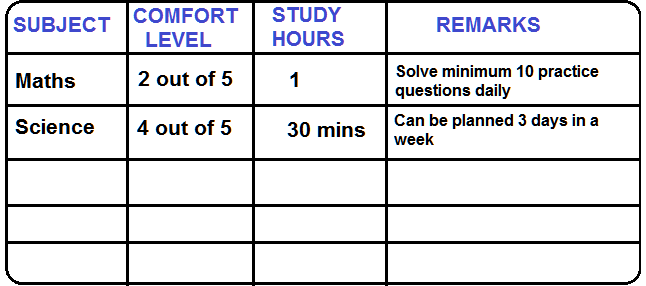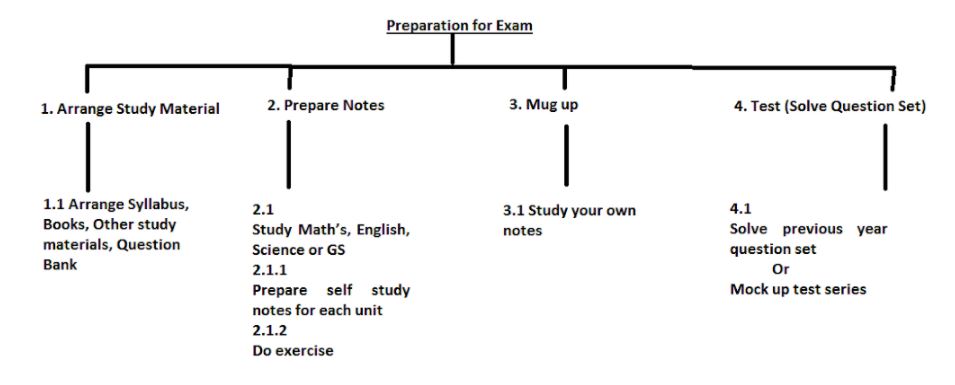6 tips, tools and techniques for better Time Management
प्रभावी ढंग से अध्ययन करने और उच्च स्कोर करने के लिए 6 समय प्रबंधन युक्तियाँ

Making the most use of your time while simultaneously keeping your task under control is the art of time management. You may increase productivity by adopting efficient time management to organize your day and set aside time for rest and self-care.
The most crucial part of exam preparation is managing your time or your timetable. Many students regard time as their adversary since they start studying a bit late, without a plan, with no priorities, creating too much uncertainty. Studying won’t be much of a help to you if you don’t know how to manage your time well since you won’t be able to adjust your course of study to meet the time you have available. Web Tutors Point has highlighted 6 time management methods & tools for students to study well and achieve good grades in their examinations.
समय प्रबंधन या अनुसूची प्रबंधन परीक्षा की तैयारी का सबसे महत्वपूर्ण पहलू है। क्योंकि वे थोड़ी देर से अध्ययन करना शुरू करते हैं और बिना किसी रणनीति के, बिना किसी प्राथमिकता के, बहुत अधिक अनिश्चितता के कारण, कई छात्र समय को अपने दुश्मन के रूप में देखते हैं। यदि आपके पास समय प्रबंधन कौशल की कमी है, तो अध्ययन आपके लिए अधिक सहायक नहीं होगा क्योंकि आप अपने पाठ्यक्रम को उस समय के अनुकूल नहीं बना पाएंगे जो आपके पास उपलब्ध है। छात्रों को प्रभावी ढंग से अध्ययन करने और अपनी परीक्षा में अच्छे अंक प्राप्त करने के लिए 6 समय प्रबंधन युक्तियों को अभी वेब ट्यूटर्स पॉइंट द्वारा हाइलाइट किया गया है।
What is Time or Schedule Management? समय या अनुसूची प्रबंधन क्या है?
The process of making sure a project is finished on time is known as time/schedule management. If you can effectively manage your time, everything will be OK.
यह सुनिश्चित करने की प्रक्रिया कि एक परियोजना समय पर समाप्त हो गई है, समय/अनुसूची प्रबंधन के रूप में जानी जाती है। यदि आप अपने समय का प्रभावी ढंग से प्रबंधन कर सकते हैं, तो सब कुछ ठीक हो जाएगा।
What are 6 tips in time management?
एक कुशल अध्ययन योजना बनाने का सबसे अच्छा तरीका क्या है?
When planning their schedules, many students get overly enthusiastic and end up having high expectations for themselves.
अपने कार्यक्रम की योजना बनाते समय, कई छात्र अत्यधिक उत्साही हो जाते हैं और अंत में अपने लिए उच्च अपेक्षाएँ रखते हैं।
1. Examine how you spend your time:
To make a schedule the activities must first be described. एक कार्यक्रम बनाने के लिए गतिविधियों को पहले वर्णित किया जाना चाहिए.
To find out how much time you’re wasting on things that aren’t linked to study, like shopping or social media surfing. Recognise how you now divide your time between various activities and tasks. You can just write down all of the things you completed from the morning until you went to bed using a copy and a pen.
2. Establish and follow a daily schedule:
Make a plan for the day. This can be done during your free time from school. Simply list all the urgent and important tasks that need to be completed on sticky note paper.
When you get home, place that note on a door, wall, or board and make an effort to stick to the timetable as precisely as you can. You must verify that all of your completed work was completed on time.
Below is an example of a daily activity check that only has two sorts of activity: the first is urgent and important, and the second is only important. You can extend your time for self study if you have a holiday.

Tools needed: Hand watch, sticky notes, pen.
3. Take short pauses (10–15 minutes) in between:
To retain attention, give yourself regular breaks and downtime.
4. Don’t do multitasking:
Avoid trying to multitask in order to increase productivity and efficiency.
5. Give others the responsibility for the less important tasks:
If at all possible, delegate or outsource less important tasks to free up your time for more important activities.
6. Keep your discipline and consistency.
Understanding the time management advice listed below can help you study well and earn a high grade.
आइए प्रभावी ढंग से अध्ययन करने और उच्च अंक प्राप्त करने के लिए 6 समय प्रबंधन युक्तियों में से प्रत्येक की जांच करें।
First step is to build a Schedule Management Plan that answers the most important issues about time.
पहला कदम एक शेड्यूल मैनेजमेंट प्लान बनाना है जो समय के बारे में सबसे महत्वपूर्ण मुद्दों का उत्तर देता है।
What happens if we fall behind schedule?
Yes, we should consider potential dangers or hazards. Do not monopolise, please. If extra time is needed, put in more work or study. Especially when the delay is brief, extra time is typically required to resume our original course. The deadline should maybe be extended, thanks. If the delay is substantial and/or working extra is not a possibility, we might try to extend the deadline. Obtain advice from professionals (such as your instructor, parents, or senior).
यह सच है कि हमें खतरों के बारे में सोचने की जरूरत है। कृपया, कोई एकाधिकार नहीं। अधिक घंटे काम करें या यदि आवश्यक हो तो अधिक समय तक अध्ययन करें। ओवरटाइम अक्सर वह होता है जो हमें ट्रैक पर वापस लाने की आवश्यकता होती है, खासकर जब देरी कम हो। कृपया समय सीमा बढ़ाने पर विचार करें। यदि विलंब न्यूनतम नहीं है और/या ओवरटाइम काम करना कोई विकल्प नहीं है तो हम समय सीमा बढ़ाने का प्रयास कर सकते हैं। विशेषज्ञों से परामर्श लें (आपके शिक्षक, माता-पिता या वरिष्ठ हो सकते हैं)।
Instead of letting time dominate you, take control of it!
समय को अपने ऊपर हावी होने देने के बजाय, उस पर नियंत्रण रखें!

Priorities Tasks based on your comfort level

How should activity be defined?
Study activities are a collection of exercises and actions carried out by students to increase their knowledge, sharpen their skills, and comprehend a subject in greater depth. Depending on the environment, such as academic, or self-directed learning, these activities can differ.
How can you effectively sequence your study activities?
To arrange study activities successfully, take the following actions:
The learning goals should be identified: The key objectives and results you hope to attain throughout your study session should be determined. You can better organise and set priorities as a result.
Analyse the content: Make smaller, more manageable sections of the study material. This will make it simpler to concentrate on particular subjects and ensure a more organised approach to learning.
The fundamentals first: Review the foundational ideas and principals associated with the subject at the start of your study session. For grasping more difficult concepts, this will lay a strong foundation.
Increase your understanding by building on what you already know. Once you have a firm understanding of the fundamentals, investigate more complex ideas and how they relate to the earlier information. You’ll gain a better comprehension of the topic as a result of this.
Put your knowledge into practise and use it: Take part in activities that let you put the skills and knowledge you’ve learned into practise. This might entail working through practical exercises, responding to inquiries, or addressing difficulties.
Review and repeat: To help you understand and remember what you’ve learned, go over the subject again and again. Self-testing, outlining the main ideas, or conversing with a study partner are all effective ways to accomplish this.
Think back and assess: Spend some time thinking about how you are learning and assessing your development. Make a strategy to fill any gaps in your knowledge and identify any areas where you might require more guidance or support.
Now, examine yourself to find out how much progress you have made.

